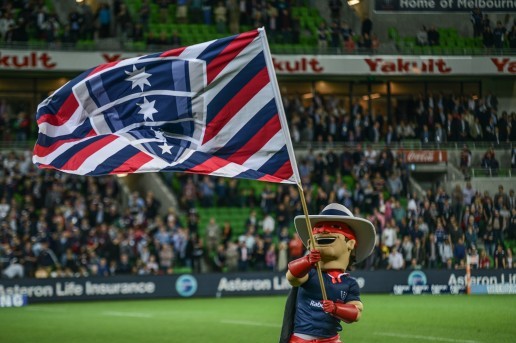Hello, and welcome to the Melbourne Rebels season review. The Rebel writers are back to share their thoughts on season 2017. With the culling shenanigans, we’ve delayed our review this year. However, with NRC about to start, it’s time to share our thoughts.
We are all passionate fans of both the Rebels, Rising, and Rugby in general. We’re excited to share our thoughts on what we saw this season.
Season 2017, in a nutshell.
The end of season 2016 left most Rebels’ fans feeling optimistic about the club’s future. The team recorded seven wins for the second straight year and even led the Australian conference at the half way point – that is, before a horrific run of injuries put an end to our finals dream. Nevertheless, 2017 would surely be the year!
During the off-season, the Rebels’ recruiters gained the services of, among others, Welsh international Dominic Day, Japanese star Amanaki Mafi, and NRL flyer Marika Koroibete. A number of exciting younger players were also brought into the fold including, Tyrel Lomax, Harrison Goddard, and Jack McGregor, and yet another Victorian product, Jordan Uelese.
The season preview highlighted a very optimistic ahead for 2017. The injury crisis would be over. Next year’s draw would be more kind. Imperium would find a new major sponsor. Yep, 2017 was going to be the year all right.
How wrong we were.
2017 has proven to be the club’s nadir, to date.
Foundation members walk a lap of honour
With up to 23 players unavailable for any given match, one of the recurring themes of 2017 was the ongoing injury crisis. Six of the playing list missed the entire season, several were restricted to just a handful of games and others found themselves in and out of the side. Former Queensland Red, Jake Schatz was brought in as cover for the injured Sean McMahon. Norths’ pair, Will Miller and Hugh Sinclair were recruited mid-season to bolster the depleted back-row, and U20’s Lock Esei Ha’angana was given his debut against the Lions.
That injury toll would cripple any Super Rugby team let alone a struggling club such as the Rebels. The injury toll cannot be simply put down to bad luck alone. Bad management must have also played a role and the Strength and Conditioning Department must answer some tough questions.
The Rebels’ draw turned out to be brutal. The season’s opening weeks saw them playing four of the five New Zealand teams, the Waratahs, and having both byes. A solitary bonus point was not the result we fans hoped for after seven weeks. Particularly tough to take was the loss against the Waratahs with the team blowing a 19 point first half lead. The Rebels only win of the season came in Round Eight, at home against the Brumbies. Despite fielding a makeshift team and receiving three yellow cards during the game the Rebels scratched out a win. Players and fans celebrated as though we had won the title and Tatts on the same night.
Celebrating that one win
The on-field battle wasn’t the only problem for the Rebels; they faced an even bigger threat off the field.
On April 10th the ARU announced that either the Western Force or the Melbourne Rebels would be cut from Super Rugby within 48-72 hours. This was despite prior assurances from the ARU that the Rebels “were safe” and also despite the fact that, as a privately owned franchise, the Rebels could only be axed if the ARU were able to buy back the license from Imperium Group.
THAT press conference.
In May, a consortium led by Rocky Elsom announced interest in purchasing the licence to save the Rebels. It appears the bid would need ARU approval to proceed, and eventually came to nothing.
Throughout the year Cox maintained that he would not sell the licence at any price if it would lead to the closure of the club. He reserved all legal rights to recover damages through the courts. Regardless of the statements made by Cox and the MRRU many commentators continued to speculate that the sale would be made and the Rebels would soon be gone.
On June 4th, Andrew Cox stepped aside as Rebels’ CEO to be replaced by General Manager of Football Operations, Baden Stephenson.
On Friday August 4th it became known that Cox had used a “put option” in his licence agreement to transfer ownership of the Melbourne Rebels to the Victorian Rugby Union, keeping his word to safeguard the franchise from the axe. The VRU has not yet indicated how the MRRU will be funded on an ongoing basis but many believe that the Victorian Government may provide substantial sponsorship.
United in adversity
From a fan’s perspective, 2017 has been a disaster. The poor on-field performance, combined with the lingering smell of death, has seen crowd numbers plummet at home games. For the players, staff and coaches it must have been an even worse year. Spare a thought for our friends in the West that have had their worst fears realised.
Departing coach, Tony McGahan
Who knows what the future has in store for the Melbourne Rebels? With a new coach, some new personnel, and a new season perhaps some of that optimism will return?


